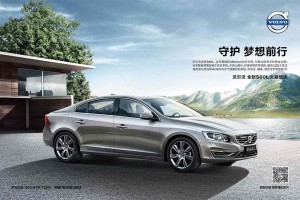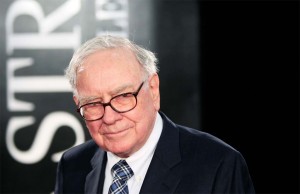
A Chinese ad for the stretched Volvo S60L represents a possible change in how makers are dealing with slowing Chinese auto sales.
China’s once red-hot automotive market appears to be cooling down along with the rest of the Asian nation’s economy – and that could create some serious headaches for manufacturers who have committed billions of dollars in investments for new products and the plants needed to build them.
The slowdown raises the possibility that after long focusing on the booming domestic market, automakers might now need to shift focus to exporting cars to Europe and the U.S. to keep their factories running at full speed. Some observers are speculating that might be one of the reasons why investment guru Warren Buffett has purchased one of the largest auto dealer networks in the U.S.
The slowdown in China nonetheless needs to be put into perspective. While the pace of growth has slowed substantially from the days when sales soared by as much as 100% annually, China’s car market is still the world’s largest and is growing at roughly the same rate as the U.S. automotive recovery.
But that’s still causing worries among industry leaders who are rethinking strategies as they shift focus from unbridled growth to a battle more focused on grabbing marketshare.

Warren Buffett's purchase of the Van Tuyl Group may provide BYD an outlet for new vehicles from China.
According to the China Association of Automobile Manufacturers, automotive sales rose a modest 6.4% in September, down from 8% in August, and a 2014 high of 13.9% in May. When all motor vehicles – including commercial trucks and buses – are included, September saw a modest 2.5% increase in demand during September. The slowdown comes as the broader Chinese economy shows signs of cooling off.
September notably saw a number of major automakers actually dip into negative territory, Nissan sales declining 21% for the month, Ford also losing a bit of ground.
Market leaders Volkswagen AG and General Motors both reported gains of around 15%, well ahead of the overall Chinese market, both setting new sales records for the month.
(Toyota recalling 1.67 million cars globally. For more, Click Here.)
Significantly, China’s indigenous brands, such as Chery and BYD, collectively gained marketshare – jumping from 37.1% in August to 38.5% in September – though they continue to lag behind foreign-owned makers.
For the month, the industry still managed to sell 1.69 million passenger vehicles, and 1.98 million vehicles overall. That puts China well ahead of the U.S. as the globe’s top-selling automotive market. And few expect to see that reverse in the years to come. While most analysts forecast the States could see a peak of perhaps 17 million vehicles before the end of the current economic cycle, China is expected to reach 35 million or more in annual sales over the course of the next decade.
(Click Here for details about GM, Chrysler recalls for airbag issues.)
Nonetheless, the current slowdown is raising questions about the aggressive expansion plans manufacturers like VW, GM, Nissan and Ford have put in place – as well as the aspiration of China’s stronger domestic producers. While there has been plenty of talk about exports over the past decade, booming internal demand has largely sucked up every vehicle the industry could produce in China.
Going forward, exports may prove essential to keep factories running at capacity. Volvo officials recently told TheDetroitBureau.com they will likely ship a small number of stretched S60L sedans to the U.S. next year from their factory in Chengdu.
(Click Here for more on Buffett’s entry into automotive retailing.)
Now attention is turning to ambitious BYD, one of China’s leading electric vehicle manufacturers. It has long delayed its own entrance to the U.S. but could soon find a ready path to access the market thanks to investor Buffett.
The “Wizard of Omaha” is one of BYD’s major shareholders. His Berkshire Hathaway investment unit also has entered the U.S. auto retailing business, earlier this month completing the acquisition of the Van Tuyl Group. That’s one of the nation’s largest auto chains, moving 240,000 vehicles worth $8 billion in 2013.
The acquisition, according to some analysts, could make it easier for BYD to access a ready American distribution network rather than having to set up a chain of its own.

When Chinese auto sales plateau, a lot of car makers are going to be in a difficult situation, especially Euro makers.